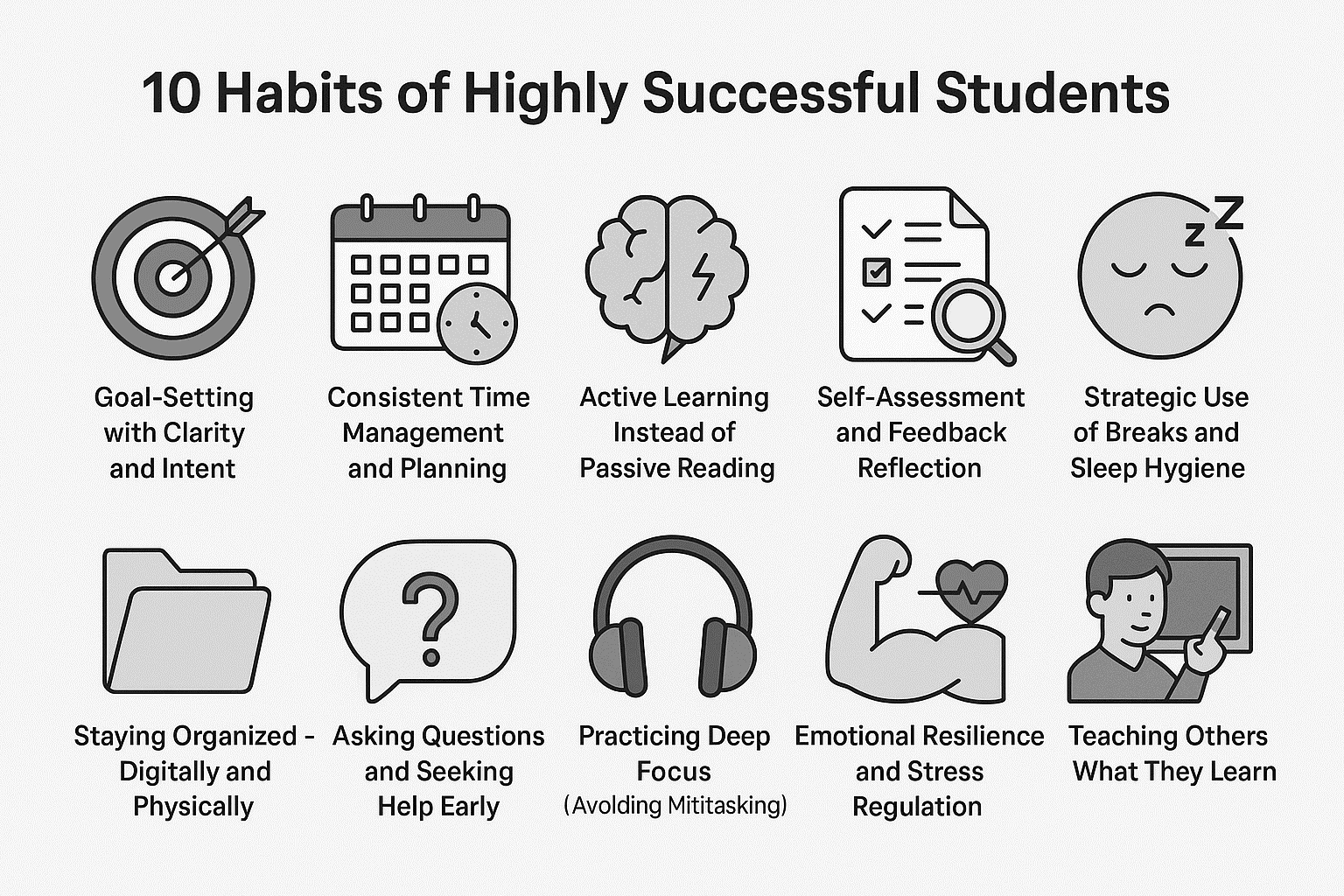
Why Study Habits Define Long-Term Success
Success in school is more than just talent or intelligence; it also requires dedication and hard work. It often boils down to the habits students develop and sustain over time. These habits aren’t shortcuts or tricks—they are intentional practices that make learning more effective, help manage stress, and foster long-term growth.
In a world flooded with distractions, mastering daily habits can help a student stand out. According to the Harvard Education Review (2021), over 80% of top-performing students attribute their academic performance to consistent study habits, rather than raw intellect.
When students have the right habits in place, they not only excel in exams but also develop essential life skills, such as self-discipline, emotional regulation, and resilience.
This article examines the ten most impactful habits that highly successful students consistently practice worldwide, regardless of their background, learning style, or educational system.
What Makes a Student “Highly Successful”?
A highly successful student isn’t always the one with the highest grades. Instead, they are consistent, curious, and adaptable. They show up even on bad days, manage their time wisely, and actively seek improvement.
Educational psychologist Carol Dweck popularized the idea of a "growth mindset," where success is tied more to effort and learning from mistakes than fixed intelligence. Similarly, emotional intelligence (Goleman, 1995) plays a key role in managing peer pressure, setbacks, and internal stress. Success, therefore, is a combination of emotional discipline, effort, and structure.
The Role of Habits in Academic and Personal Growth
Habits are the unseen architecture of success. Charles Duhigg, in The Power of Habit, explains how repeated actions form neural loops that make future decisions easier. For students, that means when study routines become habits, they no longer require mental effort to initiate.
Aristotle's old truth still applies: "We are what we repeatedly do."

Habit #1: Goal-Setting with Clarity and Intent
Successful students know exactly what they're working toward. They don’t just say "I want to do well"; they set SMART goals (Specific, Measurable, Achievable, Relevant, Time-bound). For example, instead of "I want to pass math," they aim for "I will complete 4 practice papers by next Friday."
Locke and Latham's (2002) research on goal-setting theory found that clear goals improve motivation by up to 50%. Visual tools like weekly planners or vision boards reinforce direction and progress.
Habit #2: Consistent Time Management and Planning
Time is a student’s most valuable resource. Those who master it achieve more with less stress. Time-blocking techniques, using planners, and apps like Google Calendar help allocate study slots effectively.
The Pomodoro Technique—working in 25-minute focused bursts followed by brief breaks—has become a favorite among students preparing for exams. A 2019 study by the British Journal of Educational Psychology found that students who consistently planned their time were 22% more likely to complete tasks.
Habit #3: Active Learning Instead of Passive Reading
Highly successful students engage actively with the material. They question, summarize, test themselves, and teach others. Passive reading is inefficient; active recall, mind maps, and Feynman techniques are superior.
A meta-analysis by Brown et al. (2014) concluded that active learning methods boost retention by 27% on average. Techniques such as Cornell note-taking and SQ3R (Survey, Question, Read, Recite, Review) facilitate deeper comprehension.
Habit #4: Self-Assessment and Feedback Reflection
Top students don’t wait for teachers to correct them. They self-assess using checklists, rubrics, and past papers. More importantly, they reflect on feedback.
John Hattie and Helen Timperley (2007) highlight feedback as the most powerful influence on student achievement. At institutions like Cambridge, students regularly use self-evaluation sheets to track and reflect on their academic progress.
Habit #5: Strategic Use of Breaks and Sleep Hygiene
Rest is not laziness. Students who understand the science behind breaks and sleep tend to outperform those who work nonstop. Sleep consolidates memory, regulates mood, and enhances focus.
The Sleep Foundation (2022) reported that students who sleep 7–9 hours recall 35% more information than sleep-deprived peers. Scheduling breaks using the ultradian rhythm (90-minute work cycles) also maximizes productivity.
Habit #6: Staying Organized—Digitally and Physically
Cluttered desks and scattered files lead to cognitive overload. Successful students organize notes, digital resources, and study spaces. Digital tools like Notion, Evernote, and Trello help manage assignments and deadlines.
A UCLA study (2020) showed that 78% of high-performing students maintained structured, decluttered environments that supported focus and reduced stress.
Habit #7: Asking Questions and Seeking Help Early
Rather than struggling in silence, top students raise doubts early. They benefit from peer discussions, tutor support, and open dialogue with teachers.
Vygotsky’s Zone of Proximal Development theory underscores the value of guided learning. Creating safe spaces where questions are encouraged fosters a healthier academic culture.
Habit #8: Practicing Deep Focus (Avoiding Multitasking)
Multitasking fragments attention. Research from the American Psychological Association (2018) found that task-switching reduces efficiency by 40%.
Successful students employ strategies such as app blockers, "Do Not Disturb" sessions, and designated focus zones to hone their attention spans.
Habit #9: Emotional Resilience and Stress Regulation
Anxiety is common, but highly successful students have coping mechanisms. Whether it’s journaling, mindfulness, or talking to someone, they know how to stay grounded.
The OECD's Global Student Survey (2021) found that students with higher emotional resilience had an average 23% higher academic performance. Practices like deep breathing or short meditations before tests can significantly reduce performance anxiety.
Habit #10: Teaching Others What They Learn
One of the best ways to retain knowledge is to teach it. The Learning Pyramid model indicates that effective teaching can improve retention by up to 90%.
Peer mentoring, tutoring juniors, or explaining concepts to parents or siblings can turn passive learning into mastery. A student from a Delhi government school reported a GPA jump after volunteering as a peer tutor—a classic example of this principle in action.
Neuroscience Behind Habit Formation and Learning
According to Stanford's Habit Lab, habit formation is closely tied to neural circuits and the release of dopamine. When students receive small rewards for consistent behavior (e.g., ticking off tasks), they reinforce those neural pathways.
Charles Duhigg's loop—Cue → Routine → Reward—applies well to study behaviors: the cue (alarm), routine (study for 45 minutes), reward (15-minute break).
Common Pitfalls and How to Avoid Them
-
Setting unrealistic goals → Break into smaller tasks
-
Perfectionism → Embrace progress, not flawlessness
-
Inconsistency → Use habit trackers and weekly reviews
James Clear's Atomic Habits emphasizes the power of "1% better each day." Small, repeated wins trump massive efforts followed by burnout.
Final Thoughts: Building a Mindset for Lifelong Learning
There is no one-size-fits-all blueprint for student success. But habits act as invisible scaffolding. Even if you start with just one new habit, the compounding effect over time will be transformative.
Highly successful students aren’t born—they’re built through daily, deliberate choices. So if you’re overwhelmed, just begin. Choose one habit, commit to it this week, and observe the change.
Frequently Asked Questions (FAQs)
1. How long does it take to develop a study habit?
According to studies, forming a new habit typically takes anywhere from 21 to 66 days, depending on the level of consistency and complexity.
2. What if I struggle with motivation every week?
Break goals into micro-tasks. Use external support systems like accountability partners or visual progress trackers.
3. Do digital tools really help in forming habits?
Yes, but only when used consistently. Tools like Notion or Trello help students track tasks, set reminders, and organize study materials effectively.
4. How can parents support these habits at home?
By offering a distraction-free study zone, setting expectations, encouraging healthy routines, and showing interest without micromanaging.
5. Are these habits effective for slow learners too?
Absolutely. These habits are not tied to the speed of learning but to consistency. In fact, structured habits often benefit slow learners the most by reducing overwhelm and building confidence.
Study Tips Students

